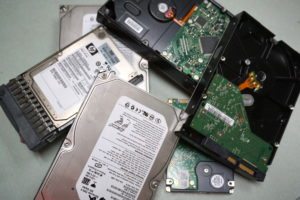If you don’t work in IT, take computers apart for fun, or even care about what happens inside your laptop, you may not realize that not all hard drives are created equal. Yes, they all store data — but they don’t all do it in the same way.
Many computers use a type of drive called a hard disk drive (HDD). An HDD contains metal disks that look like CDs, which hold your data. Those disks, or platters, spin around a spindle while a metal arm reads and writes that data, much in the way that a record player works.
When you’re done with an HDD and want to destroy it, you have a few different options. Powerful magnets may wipe the disks of their data. Drilling holes through the disk is effective too. It’s also possible to destroy the platters using acid or intense heat. These methods can be dangerous and data may still be recoverable if you don’t know what you’re doing, though; shredding is the most definitive way to destroy an HDD. But ultimately, if you do enough damage to the platters of an HDD, cybercriminals can’t access its data.
Here’s the problem: your computer may have a hard drive that’s not easy to destroy. The growing popularity of solid state drives is changing the way companies can dispose of their electronics. A solid state drive (SSD) stores data on a series of connected memory chips. Like HDDs, SSDs are used for both internal and external hard drives.
It’s becoming more and more popular for computers to be manufactured with SSDs because of their processing speed and durability. They have no moving parts, making them less likely to break when jostled compared to hard drive disks. That durability has a downside, though. Because solid state drives are hard to destroy, users can’t effectively wipe their data when they’re ready to dispose of devices that use these drives.
Solid state shredding is a process that completely destroys these drives and the memory chips that they use. A solid state shredder can turn those memory chips into strips or chunks so small that they can’t possibly be reassembled or used, effectively preventing any data from being compromised.
Any organization that uses devices with solid state drives needs to work with a professional data destruction firm to dispose of them. Most commercial shredders aren’t equipped to handle solid state drives or their memory chips. More and more companies will have to arrange for solid state shredding in coming years, as the first generations of computers made with SSDs become obsolete.
Industrious data thieves know that these devices are goldmines, and that many people don’t know how hard it is to destroy them. Anyone who uses a computer with a solid state drive will eventually need to find a company with the right equipment to shred it completely.
Keeping your data safe is what Northeast Data Destruction does best. Contact us today to talk about how we can meet your shredding needs.
